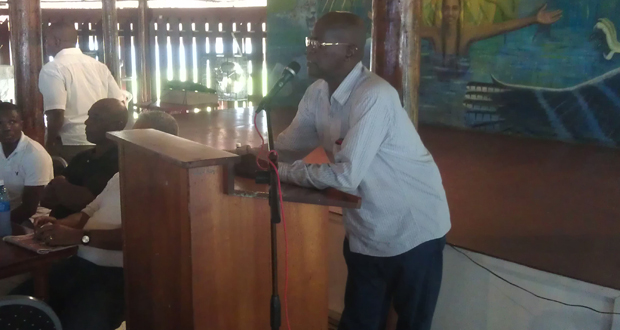Region 10 loggers throw collective weight behind Bai Shan Lin
–in face of Kaieteur News’ rabid anti-investment stance

Forestry stakeholder, Mr. Phillip Bynoe addressing the gathering at the Umana Yana yesterday
NEGATIVE reporting and its effect on the future of the forestry sector was but one of the many concerns raised yesterday as scores of loggers gathered at the Umana Yana to “once and for all” put to rest speculations abroad about alleged malpractices in the industry.The occasion was a public meeting of loggers drawn from ten major organisations in Region 10 (Upper Demerara- Berbice), among them the Maria Elizabeth Three Friends Small Loggers Association; the Coomacka Forest Producers and Agricultural Association; the Linden Agriculture & Forest Producers Association; the Blueberry Hill Small Loggers Association; the Ituni Natural Resources Organisation; the Kwakwani Natural Resources Organisation; the Rockstone Small Loggers Association; the Region No. 10 AFPA; the Upper Berbice Forest Producers Association; MAC Enterprise; and the Araima Natural Resource Organisation.
AGENDA OF INDEPENDENT MEDIA
Under one voice, these loggers gathered in their numbers to defend their position and express their concerns with the anti-investment stance taken by the local daily, Kaieteur News. Leading the charge was forestry sector stakeholder, Phillip Bynoe, who asserted that: “Kwakwani today is buzzing with economic activity that has come because of the Chinese.”
Bynoe, who recently became the focal point of the KN Bai Shan Lin campaign, refuted the claim that he had threatened the independent media reporters. On the level of misinformation, he said, “When media houses without any knowledge about the circumstances on the ground pursue their own agendas, and they create dislocation and harm to the communities of Guyana, particularly in this case, Region 10, they don’t come back and say they are sorry when they are presented with the facts.”
Bynoe expressed concern that although the media house at reference had been invited to the meeting, “they have not even visited here today.” Bynoe bemoaned what he called the agenda of the independent media with an obvious and callous “axe to grind.”
He further said that although Forestry Commissioner James Singh had gone to great lengths to correct the errors in the media regarding forestry procedures, the Kaieteur News, rather than devote space to it in their newspapers today, instead gave priority to other things.
NO THREATS
Bynoe maintained that he made no threats to the reporters of Kaieteur News. Giving his account of the incident, he said: “I never threatened them, or abused them.” He added that he only uttered, “Shame on Kaieteur News.”
Confident in his position and fully endorsed by the hundreds of loggers in attendance Bynoe emphatically stated, “I will repeat that from the tip of this Umana Yana, with a loud megaphone in my hand, I will tell the world “Shame on Kaieteur News.”
Bynoe repeated the chant time and time again as the crowd erupted in applause. He said, “We must all echo in one voice ‘SHAME ON KAIETEUR NEWS!’”
ONE VOICE
The Guyana Chronicle caught up with one representative of the united group of loggers, who identified herself as Secretary of the Linden Agriculture & Forest Producers Association, Ms. Lynette Benn.
For her part, Benn voiced her concern that the Chinese exporters have been attacked repeatedly by the Kaieteur News “as if they are in violation of the principles… [of] forestry management in the various regions in Guyana.”
“We saw this as a threat to our communities and to our association, in the light that before the Chinese came, there was actually no exporter or no buyer for our producers and so we are not here to defend the Chinese, we are here to say to the public and more so the Kaieteur News that the Chinese… are not in violation of any principles governing the Forestry Act.
“Should the Chinese decide to leave or not to do business anymore because that is published and it is in the international world, it is a challenge for their exporters and we thought that we should come out and speak the truth that most of the logs was not harvested by the Chinese [but] also came from other loggers in Region 10,” Benn declared.
At a Guyana Forestry Commission news conference yesterday, Forestry Commissioner James Singh had made clear that the images which were published by KN, regarding a sprawling land with countless felled logs as that of Bai Shan Lin, were erroneous because the logs belonged to other loggers in the region who held concessions in that area and would instead place the logs in a “log market” for examination and verification by the GFC.
Source -- http://guyanachronicle.com/reg...behind-bai-shan-lin/





